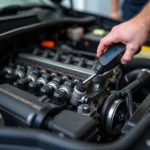Transporting LPG cylinders in cars requires careful consideration and adherence to safety regulations. This guide provides essential information on safe handling, legal requirements, and best practices for transporting LPG cylinders in your vehicle.
Understanding the Risks and Regulations of Transporting LPG Cylinders
Transporting LPG cylinders might seem simple, but it carries inherent risks if not handled properly. LPG (Liquefied Petroleum Gas) is a flammable and potentially explosive substance. Understanding these risks and following the correct procedures is crucial for your safety and the safety of others. Regulations regarding transporting LPG cylinders vary by location, so it’s essential to familiarize yourself with your local laws. These regulations often cover aspects like the maximum quantity allowed, ventilation requirements, and specific safety measures.
Safe Handling Practices for LPG Cylinders in Transit
Safe handling practices are paramount when transporting LPG cylinders. Always ensure the cylinder valve is completely closed and that the cylinder is secured upright in your vehicle. Using a dedicated cylinder restraint or a sturdy box with proper padding can prevent movement and potential damage during transit. Never leave LPG cylinders in a hot car, as high temperatures can cause the gas to expand and potentially lead to leaks or even explosions. Adequate ventilation is also key, so ensure your car windows are slightly open during transport.
Choosing the Right Transportation Service for LPG Cylinders
If you need to transport a large quantity of LPG cylinders or are uncomfortable handling them yourself, consider using a professional transporting service. Choose a company specializing in hazardous material transport and possessing the necessary permits and insurance. A reputable service will have trained personnel equipped to handle LPG cylinders safely and comply with all relevant regulations. When selecting a service, inquire about their safety record, training procedures, and emergency response protocols.
Legal Requirements for Transporting LPG in Cars
Regulations governing the transport of LPG in personal vehicles differ significantly depending on the jurisdiction. Some areas may limit the number of cylinders you can carry, while others may require specific signage or safety equipment. Always check with your local authorities or Department of Transportation for the most up-to-date regulations in your area. Ignoring these regulations can result in hefty fines and even legal action.
What are the common legal requirements for transporting LPG in cars?
Common regulations often include limits on the number of cylinders, mandatory signage, and specific safety equipment requirements.
Best Practices for a Safe and Compliant Trip
Beyond adhering to legal requirements, adopting best practices can significantly enhance safety during LPG transport. Planning your route to avoid congested areas or routes known for rough terrain can minimize the risk of accidents and cylinder damage. Regularly inspecting your cylinders for any signs of damage, such as dents or leaks, is crucial. Never attempt to repair a damaged cylinder yourself; instead, contact a qualified professional for assistance.
How can I ensure a safe journey when transporting LPG in my car?
Plan your route carefully, inspect cylinders for damage, and avoid congested areas or rough terrain.
Finding a Reliable and Reputable LPG Transporting Service
When selecting a professional transporting service, research is key. Look for companies with a proven track record in handling hazardous materials and a commitment to safety. Reading online reviews and seeking recommendations from local businesses can help you identify reputable services. Comparing quotes from multiple providers ensures you receive a competitive price while maintaining high safety standards.
Conclusion
Transporting LPG cylinders in cars requires meticulous attention to safety and compliance with regulations. By adhering to best practices and understanding the potential risks, you can ensure a safe and incident-free transport experience. Whether handling the transport yourself or using a professional service, prioritizing safety is paramount for protecting yourself and others. Remember to check local regulations for Transporting Service For Lpg Cylinders In Cars.
FAQ
- What is the maximum number of LPG cylinders I can transport in my car? This depends on local regulations, so check with your local authorities.
- Do I need special signage when transporting LPG cylinders? Again, this is determined by local regulations.
- What should I do if I smell gas while transporting an LPG cylinder? Immediately pull over in a safe area, turn off the engine, and evacuate the vehicle. Contact emergency services and the LPG supplier.
- Can I transport a damaged LPG cylinder? No. Contact a qualified professional for assistance.
- How do I find a reputable LPG transporting service? Research online, read reviews, and seek recommendations.
- What type of vehicle is suitable for transporting LPG cylinders? A well-ventilated vehicle with appropriate restraints is recommended.
- Are there specific insurance requirements for transporting LPG cylinders? Consult your insurance provider for details on coverage related to hazardous materials transport.
Common Scenarios and Questions:
- Scenario: You need to transport two LPG cylinders for a camping trip. Question: Can you transport them in your car, and what precautions should you take?
- Scenario: You own a small business and regularly transport LPG cylinders. Question: What are the legal requirements and best practices for safe and compliant transport?
- Scenario: You smell gas while transporting an LPG cylinder. Question: What steps should you take to ensure your safety and the safety of others?
Further Reading and Resources
- Check out our article on “Safe Handling of LPG Cylinders at Home” for more information on general LPG safety.
- Learn more about “Choosing the Right LPG Supplier for Your Needs” on our blog.
Need help? Contact us via WhatsApp: +1(641)206-8880 or Email: [email protected]. Our customer support team is available 24/7.

